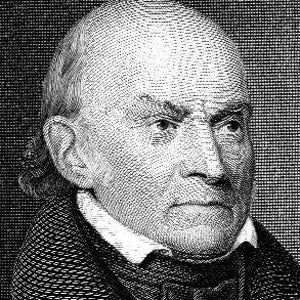
Despite being born and bred for the role, John Quincy Adams was one of the least liked presidents. Brilliant, hard-working and idealistic, he was also charmless and prone to depression. He was only the second president not to be re-elected. (His father was the first.)
He worked as his father's secretary while he was a diplomat in Europe, and was later appointed to a series of diplomatic posts himself, in the Netherlands, Prussia, Russia and Great Britain. An accomplished linguist – he spoke seven languages – he also wrote copious diaries.
He became a Senator in 1802, and in 1814 was chief negotiator of the Treaty of Ghent, which ended the war with Britain. He then became Secretary of State under President Monroe. He was instrumental in obtaining from Spain the cession of the Floridas, helped to formulate the Monroe Doctrine, and was generally considered a towering success in the role.
His election to the presidency, in 1824, was messy. No candidate won a majority of electoral votes, and the election was decided by the House of Representatives. His main rival, Andrew Jackson (who had won substantially more popular votes and electoral votes), accused Adams of securing victory through a "corrupt bargain" with another candidate, Henry Clay, whom Adams appointed Secretary of State.
The hostility of Jackson and his supporters proved a constant handicap to Adams. His attempts to develop a national infrastructure of highways and canals – and a national university – were criticised as unconstitutional. Repeated charges of corruption – apparently unfounded – further undermined his popularity, and Jackson defeated him comfortably in 1828. Like his father, Adams left town in order to avoid his successor's inauguration.
Depressed by his defeat ("I have no plausible motive for wishing to live," he wrote in his diary), Adams retired to his farm in Massachusetts. But in 1830 he was unexpectedly elected to the House of Representatives, where he proved a far more effective figure than he had as president, tirelessly defending civil liberties. It was here that he earned his nickname, "Old Man Eloquent". His greatest success was obtaining the repeal (after an eight year battle) of the 1836 "gag rule", passed by southern Congressmen, that prevented the issue of slavery from being debated in the House.
In 1848, he collapsed on the floor of the House from a stroke. He died two days later.
In his own words
"The four most miserable years of my life were my four years in the presidency."
"I am a man of reserved, cold, austere and forbidding manners: my political enemies say, a gloomy misanthropist, and my personal enemies, an unsocial savage."
In others' words
"A disgusting man to do business [with]. Coarse, dirty and clownish in his address and stiff and abstracted in his opinions, which are drawn from books exclusively." William Henry Harrison
Minutiae
Adams had an eye wound, sustained while trying to instruct his sons in the correct use of firearms.
Adams was an unforgivingly perfectionist parent, once forbidding his son to visit him until he had improved his class rankings at school. Two of his three sons became alcoholics, of whom one probably committed suicide.
He was fond of taking ice-cold baths, and was also a keen swimmer. He regularly swam in the Potomac river, often in the nude, last doing so when he was 79.
Join our commenting forum
Join thought-provoking conversations, follow other Independent readers and see their replies
0Comments